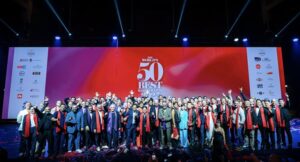New York — Nvidia has once again set a new standard for artificial intelligence hardware with the introduction of Blackwell Ultra, a revolutionary AI chip platform designed to push the boundaries of machine reasoning and decision-making. Announced at the company’s annual GTC conference, Blackwell Ultra marks a significant leap in AI’s ability to analyze complex problems, process vast amounts of data, and generate responses with unprecedented contextual awareness. The unveiling of this next-generation platform signals a future where artificial intelligence moves beyond conventional chatbots and into more autonomous, human-like cognitive functions.
The rapid evolution of AI has brought extraordinary advancements in language processing, predictive analytics, and machine learning, yet one of the most elusive capabilities—true reasoning—has remained a challenge. AI systems have traditionally been confined to pattern recognition, relying on statistical probability to predict and generate responses. Blackwell Ultra introduces a paradigm shift by enabling AI models to think through a problem systematically, break it into logical components, and evaluate multiple potential outcomes before formulating a response. Nvidia asserts that the new platform dramatically accelerates the processing of complex queries, cutting response times from over ninety seconds on its predecessor, the Hopper chip, to just ten seconds on Blackwell Ultra. This significant reduction in computational latency positions Blackwell Ultra as a game-changer in AI performance.
The demand for high-performance AI chips has surged since OpenAI launched ChatGPT in 2022, prompting an industry-wide race to develop more powerful and efficient computing solutions. As artificial intelligence becomes integral to business operations, consumer applications, and research, companies have sought advanced hardware to sustain the exponential growth of AI workloads. Nvidia has emerged as the dominant force in this sector, supplying the technology behind AI-driven platforms operated by Microsoft, Amazon, and Google. The company’s aggressive innovation strategy has not only strengthened its leadership but has also fueled an unprecedented rise in its market valuation.
Despite its commanding presence, Nvidia faces growing competition from emerging players in AI hardware. Among them, DeepSeek—a Chinese tech startup—has captured industry attention with its R1 model, known for its ability to perform reasoning tasks with remarkable efficiency at a fraction of the cost of high-end AI chips. This development has sparked debate over whether expensive AI hardware will remain essential for driving artificial intelligence forward. Nvidia has countered this narrative by delivering record-breaking earnings and reinforcing its technological edge. The launch of Blackwell Ultra signals the company’s intent to maintain its stronghold in AI computing by continuously setting new benchmarks for speed, efficiency, and reasoning capability.
Industry giants such as Cisco, Dell, HP, Lenovo, and Supermicro have already begun integrating Blackwell Ultra into their next-generation server architectures. The adoption of Nvidia’s latest platform by these leading firms underscores the growing confidence in its capabilities and its potential to redefine AI infrastructure. The first wave of Blackwell Ultra-powered products is expected to hit the market in the second half of 2025, paving the way for a new era of intelligent computing solutions.
One of the most promising aspects of Blackwell Ultra lies in its ability to enhance AI’s reasoning capabilities, allowing systems to approach problems with greater depth and adaptability. Nvidia has demonstrated practical applications of this technology, such as using AI-powered reasoning models to optimize seating arrangements for a wedding. A model powered by Blackwell Ultra could analyze guest relationships, preferences, and cultural sensitivities to generate an optimal seating plan that ensures harmony and balance. Such applications highlight AI’s growing role in real-world decision-making, moving beyond static responses to actively solving complex logistical challenges.
The pursuit of advanced reasoning models is gaining momentum across the AI industry, with major technology firms investing heavily in developing more sophisticated computational frameworks. Google has enhanced its Gemini models to improve analytical reasoning, while Anthropic has introduced Claude 3.7 Sonnet, a hybrid AI designed to tackle intricate cognitive tasks with greater precision. The competition to push AI’s intellectual capabilities forward is intensifying, setting the stage for a future where machine intelligence can rival human-level problem-solving.
Beyond reasoning, Blackwell Ultra is also expected to accelerate the emergence of AI agents—autonomous digital assistants capable of executing complex tasks and making independent decisions. Unlike traditional AI models that provide passive responses, AI agents are envisioned as proactive entities capable of handling multifaceted workflows. Companies like Google, Amazon, and Qualcomm have already begun conceptualizing AI-powered assistants that can plan entire vacations, manage business operations, or execute financial transactions based on real-time inputs and evolving user needs.
Gene Munster, managing partner at Deepwater Asset Management, has emphasized the transformative potential of agentic AI, noting that the ability to multitask and reason effectively will make these digital assistants indispensable across industries. As AI continues to evolve, its ability to independently process information, make judgments, and take actions will redefine how technology integrates into daily life.
Nvidia’s Blackwell Ultra represents more than just an advancement in computing power—it is a pivotal step toward the realization of AI that can think, reason, and act with an unprecedented level of sophistication. As AI-driven decision-making becomes increasingly central to business, research, and consumer applications, the impact of these technological strides will be felt across industries, reshaping the future of artificial intelligence and its role in society.








